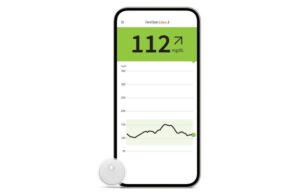
AID systems help people manage daily diabetes care by automatically adjusting and administering the insulin delivered by an insulin pump based on real-time glucose data from their FreeStyle Libre 2 or FreeStyle Libre 3 sensors.
The company said in a news release that it modified the FreeStyle Libre 2 and the next-generation FreeStyle Libre 3. FreeStyle Libre 3 received FDA clearance in May 2022. The modifications allowed for the integrated CGMs to combine with AID systems, Abbott said.
“Our goal is to make diabetes care as easy as possible,” said Jared Watkin, SVP for Abbott’s diabetes care business. “The FreeStyle Libre portfolio is already the most prescribed CGM in the United States³ and, with the integration of automated insulin delivery systems, people in the U.S. will soon have an affordable2 option to pair with insulin pumps. This means less time thinking about diabetes and more time living.”
BTIG analyst Marie Thibault maintained her “Buy” rating for Abbott after its “long-awaited win.”
“We view this as a significant milestone that unlocks a new patient population for the company; about a third of the nearly [2 million] type 1 patients in the U.S. currently use an insulin pump to manage their diabetes,” Thibault said.
What the FDA clearance means for Abbott
Abbott already has ongoing collaborations with insulin pump manufacturers to integrate its CGMs with the systems. The company said the efforts aim to do so “as soon as possible.” On the company’s fourth-quarter earnings call, CEO Robert Ford called automated insulin delivery integration a “key growth driver” for 2023.
Companies partnering with Abbott include Insulet and Tandem Diabetes Care. Both companies integrate their AID systems with Dexcom’s CGMs already. Abbott said these partnerships enable future integrations in multiple countries, including the U.S.
The company already has authorization for AID integration outside the U.S. At the end of last year, the company received authorization to integrate FreeStyle Libre 3 with the mylife Loop from Ypsomed and CamDiab. That collaboration began in Germany. Abbott plans launches in the UK, Switzerland and the Netherlands in the first half of this year.
Abbott also received clearance for its modified sensors for use by children as young as two years old. The wear time lasts up to 15 days. Current indications for both Libre systems covered people four years and older with a wear time up to 14 days.
The clearance also allows for use of the CGMs for pregnant women with all types of diabetes. This represents a major market play in the CGM space.
Abbott plans to make the modified FreeStyle Libre systems available in the U.S. later this year. Over time, they will replace the currently available sensors in the country.
A big year ahead for CGMs
Abbott’s good news today follows a massive boost for CGM makers that came last week.
The Centers for Medicare & Medicaid Services published a final local coverage determination (LCD) expanding coverage for CGMs. New, expanded coverage of CGMs under Medicare go into effect in April. The modified coverage includes people with diabetes who receive insulin treatment or have a history of problematic hypoglycemia. The proposal eliminates the requirement for frequent adjustments of the patient’s insulin treatment regimen. This falls on the basis of glucose measurement testing.
In a separate report, Thibault labeled it another big win for Abbott, among others.
“In our view, this is a significant catalyst that will increase CGM adoption in this patient population, benefiting both Abbott and [Dexcom],” Thibault wrote.
Abbott already has big plans for 2023 with its FreeStyle Libre platform. Ford said on the company’s recent earnings call that the company is going full-steam ahead with its sensor this year.
“For Libre 3, we wanted to go more aggressively in some of these markets,” Ford said. “I expect continued growth in the U.S. in terms of market expansion. … Can we see a path for 20% growth in 2023? Yeah, I can. I think there’s a lot of opportunities for growth.”

